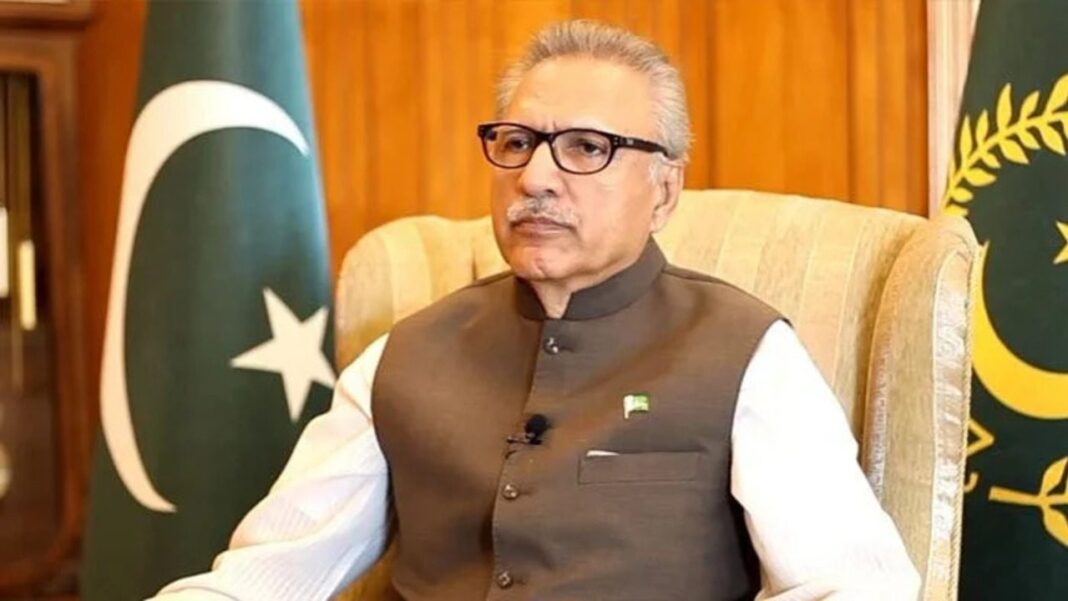President Dr. Arif Alvi has said that in order to avoid the negative effects of climate change, adopt a sustainable lifestyle, protect natural water resources as well as save the earth, ensure fertile soil protection and bring about global change partnerships need to be fostered.
According to the official news agency APP, in a statement issued from the Presidency on the occasion of World Environment Day, the President said that Pakistan is one of the countries most affected by climate change.
He said that the government and the people of Pakistan are facing severe challenges due to climate change, Pakistan is being affected by rapidly melting glaciers, unpredictable rains and drought.
The President said that the youth need to be educated on how to tackle the challenge of climate change and adopt an eco-friendly lifestyle for a better future.
“I am proud that the presidency is one of the first eco-friendly presidential offices in the world to be certified by the ISO also provides power plant. “I invite all institutions to learn from the Green Presidency project, to save energy so that we can serve the people more effectively,” he said.
Dr. Arif Alvi lamented that Pakistan’s forests, biodiversity and wildlife resources are being adversely affected by climate change, land use change and population growth.
He said that the challenge of climate change needs to be addressed through a series of initiatives under long-term planning and programs.
He said that the existing forest resources are important for environmental sustainability and serious measures are needed to improve the forest, wildlife and biodiversity sectors.
The President said that the United Nations World Environment Day is dedicated to focusing on environmental issues and taking positive steps, the purpose of this day is to encourage people around the world to think about their relationship with nature.
He said that healthy environment has a key role to play in achieving many of the 17 Sustainable Development Goals (SDGs) efforts need to be made to save diversity from extinction.
If timely steps are not taken, climate change will be detrimental to future generations, Sherry Rehman
On the other hand, Federal Minister for Climate Change, Senator Sherry Rehman, has said that if the effects of climate change are not mitigated, it will be detrimental to the future of the country and future generations.
The Federal Minister said in a video message that the purpose of celebrating ‘Environment Day’ is to create awareness among the people about climate change.
She said that not only Pakistan and South Asia but the whole world is being affected by the extraordinary effects of climate change, climate change is the biggest challenge of the 21st century.
She said that as a Pakistani nation we are at the forefront of global climate emergency, Pakistan is one of the few countries in the world which is facing severe effects and threats of climate change.
“We are facing extreme temperatures and severe drought, our forests are burning, glaciers are melting and rivers are drying up, we have to be careful in using water,” Sherry Rehman said.
“Humans are doing a lot of injustice to the earth and the natural environment. We must protect the sea, the air and our land from pollution,” she said.
The Federal Minister suggested that climate culture needs to be adopted to deal with the climate crisis.
She said that every Pakistani citizen has to play his role for the protection of environment and protection of his motherland.
A clean and healthy environment is possible only when every citizen fulfills his national and moral responsibility.
In the video message, she stressed to the people that there is only one Pakistan on this planet and only by protecting the environment of the country can we save our country.
A White House report warns that interstate water disputes are on the rise in South Asia.
The report said that the Indus Water Treaty between Pakistan and India has endured six decades and four wars but now it is facing regional pressure due to population growth and differences over the use of hydro-power.
The report also predicts that by 2040, Afghanistan, Kyrgyzstan, Kazakhstan, Pakistan, Turkmenistan and Uzbekistan will be among the world’s most water-scarce countries.
“Climate change is already affecting the region, with rising temperatures, low rainfall and displacement of glaciers putting more pressure on water supplies,” the paper said.
Also Read: Pakistan May Face Severe Water Shortage, Sherry Rehman


